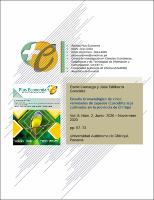Estudio bromatológico de cinco variedades de zapallos (Curcubita ssp) cultivados en la provincia de Chiriquí

Fecha
2020Autor
Camargo, Esmit B.
González, José Edilberto
Metadatos
Mostrar el registro completo del ítemResumen
Cucurbits (squash) are herbaceous plants with climbing stems with tendrils. It groups the species Cucurbita pepo, Cucurbita maximumand Cucurbita moschata, differentiated by their growth habit, shapeand size of their fruits. It has vulgar names like pumpkin, gourds, zucchini, auyama, others. The genus Cucurbita,native to the American continent, has Mexico and Central America as its center of origin. Currently, world production of squash and gourdscovers an area of 1775000 ha, with a production of 24,3 million tons. This research evaluates the chemical and nutritional composition of five varieties of squash grown in the Province of Chiriquí. The samples are subjected to tests of percentage of moisture, ash, crude protein, crude fiber and vitamin B, being analyzed by the proximal analysis method. It is determined if there are significant differences between the nutritional components of the five varieties in order to know and disclose their nutritional content. Las Cucurbitáceas (zapallo), son plantas herbáceas de tallos trepadores conzarcillos. Agrupa las especies Cucurbita pepo,Cucurbita máximay Cucurbita moschata,diferenciadas por su hábito de crecimiento, forma, tamaño de sus frutos. Presenta nombres vulgares como calabaza, calabacera, pumpkin, otros. El género Cucurbita,originarias del continente americano, tiene a México y América Central como centro de origen.Actualmente,la producción mundial de zapallos y calabazas ocupa una superficie de 1 775 000 ha, con una producciónde 24,3 millones de ton. Esta investigación evalúa la composición química y nutricional que poseen cinco variedades de zapallo cultivadas en la Provincia de Chiriquí. Las muestras se someten a ensayos de porcentaje de humedad, cenizas, proteína cruda, fibra cruday vitamina B,siendo analizadas mediante el método de análisis proximal. Se determina si existen diferencias significativas entre los componentes nutricionales de las cinco variedades para poder conocer y divulgar su contenido alimenticio.
URI
http://jadimike.unachi.ac.pa/handle/123456789/708https://revistas.unachi.ac.pa/index.php/pluseconomia/article/view/470
